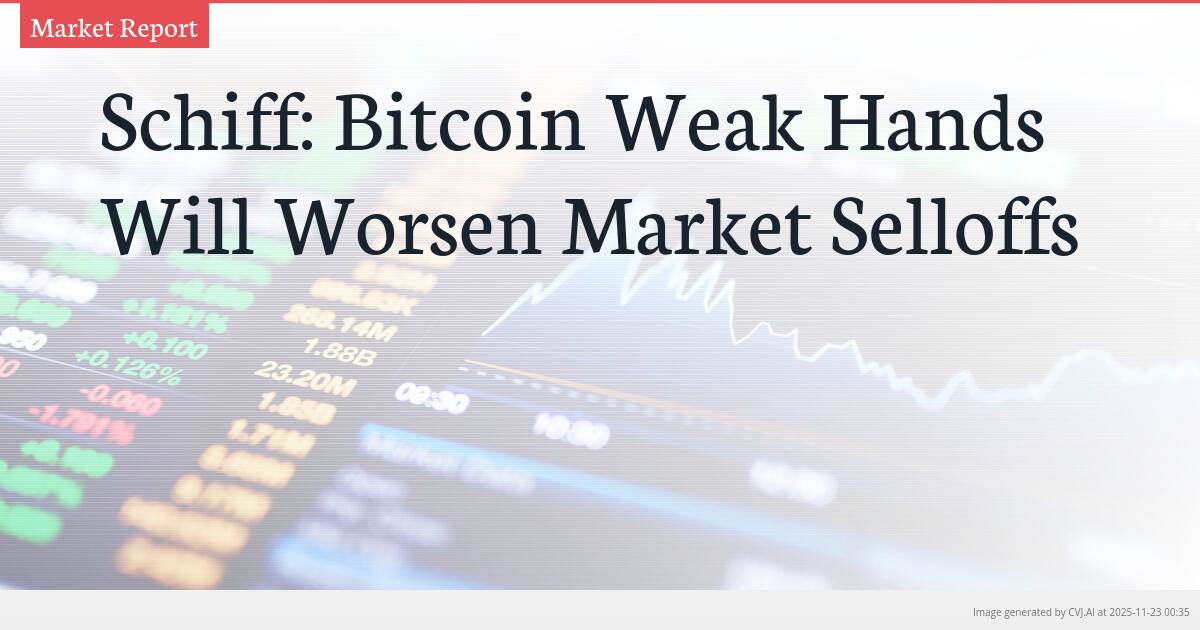Introduction
Prominent gold investor and economist Peter Schiff has issued a stark warning about Bitcoin’s market dynamics, predicting that the transfer of BTC from long-term holders to inexperienced ‘weak hands’ will intensify future market downturns. Schiff argues that Bitcoin is experiencing its ‘IPO moment’ with sufficient liquidity now enabling original investors to cash out significantly. This fundamental shift in ownership structure could lead to more severe selloffs during periods of market turbulence as new investors panic-sell at the first sign of trouble.
Key Points
- Peter Schiff compares Bitcoin's current market phase to an 'IPO moment' where long-term holders can finally cash out
- Transfer of Bitcoin from 'strong hands' (long-term holders) to 'weak hands' (new investors) increases market volatility risk
- Schiff predicts future Bitcoin selloffs will be more severe due to inexperienced investors panic-selling during market turbulence
The Great Bitcoin Handoff: From Strong to Weak
According to Peter Schiff’s analysis, Bitcoin is undergoing a critical transition phase where long-term holders, often referred to as ‘OGs’ or ‘strong hands,’ are transferring their holdings to what he characterizes as ‘weak hands’ – newer, less experienced investors. This transfer represents a fundamental shift in the Bitcoin ownership landscape that Schiff believes will have profound implications for market stability. The economist specifically noted that ‘this much Bitcoin moving from strong to weak hands not only increases the float, but also means future selloffs will be bigger,’ highlighting the dual impact of increased supply availability and reduced holder resilience.
Schiff’s characterization of this development as Bitcoin’s ‘IPO moment’ suggests he views the current market conditions as analogous to a company going public, where early investors finally have sufficient liquidity to exit their positions at scale. This comparison underscores his belief that Bitcoin has reached a level of market maturity and liquidity that enables significant position unwinding by those who have held through previous market cycles. The increased market depth, while typically viewed as a positive development for asset maturity, is framed by Schiff as creating conditions for substantial distribution from committed to less committed holders.
The Psychology Behind Market Drawdowns
The core of Schiff’s warning centers on the behavioral differences between long-term Bitcoin holders and new market participants. Long-term holders, having weathered multiple market cycles and significant volatility, typically demonstrate greater conviction during downturns. Their experience with Bitcoin’s historical price movements often makes them less likely to panic-sell during temporary market setbacks. This resilience has historically provided stability during correction periods, as these ‘strong hands’ absorb selling pressure and maintain their positions through market turbulence.
In contrast, ‘weak hands’ – the newer investors now accumulating Bitcoin – lack this historical perspective and emotional fortitude. Schiff predicts these investors ‘will dump at the first sign of trouble,’ creating a feedback loop that exacerbates market declines. This behavioral pattern is well-documented across financial markets, where inexperienced investors tend to make emotionally-driven decisions during volatility, often selling at market bottoms and buying at peaks. In Bitcoin’s case, with its reputation for extreme volatility, this tendency could be particularly pronounced among newcomers unfamiliar with the asset’s characteristic price swings.
The concentration of Bitcoin in ‘weak hands’ creates what Schiff describes as a powder keg scenario – where any significant market stress could trigger disproportionate selling responses. Unlike long-term holders who view corrections as buying opportunities or temporary setbacks, newer investors are more likely to interpret market declines as signals of fundamental problems, leading to panic-driven liquidation. This dynamic could transform what might otherwise be routine market corrections into more severe and prolonged downturns.
Market Implications and Future Volatility
Schiff’s analysis suggests that the changing composition of Bitcoin ownership will fundamentally alter the asset’s risk profile. The increased ‘float’ – the amount of Bitcoin readily available for trading – combined with the psychological predisposition of new holders creates conditions for amplified market movements. During periods of market stress, the simultaneous selling pressure from multiple ‘weak hands’ could overwhelm buying interest, leading to steeper price declines than historically observed.
This warning comes at a time when Bitcoin has achieved broader mainstream acceptance and accessibility through various financial products and platforms. While this development has brought increased liquidity and institutional participation, Schiff’s perspective highlights the potential downside: the influx of less sophisticated investors who may lack the conviction to hold through significant volatility. The very factors that have contributed to Bitcoin’s market maturation – increased accessibility, regulatory clarity, and financial product development – may also be creating the conditions for more severe future corrections.
The implications extend beyond short-term price movements to potentially affect Bitcoin’s long-term narrative as a store of value. If Schiff’s predictions materialize and future drawdowns become more severe due to weak-handed selling, it could challenge Bitcoin’s perceived stability and reliability as an asset class. This dynamic represents a critical test for Bitcoin’s market structure as it transitions from a niche asset dominated by crypto-native holders to a mainstream financial instrument attracting broader, but potentially less committed, investor participation.
📎 Source reference: cointelegraph.com

